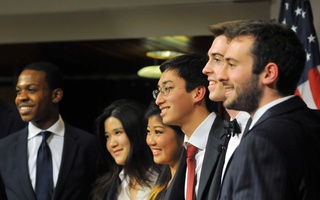With next year’s UC vice presidential seat soon to be vacant, three of the four candidates who lost their presidential or vice presidential bids last month say they are uncertain of whether they will pursue the position.
After Samuel B. Clark ’15 and Gus A. Mayopoulos ’15—two UC outsiders and this year’s joke ticket—won the UC presidential election last month, they immediately pledged to resign as soon as possible. However, on Monday night, Mayopoulos reversed his position, saying he would not be resigning after all and instead assume the presidency. Mayopoulos’s move vacates the vice presidential seat, which will be filled in an internal UC election on Dec. 8 in which, theoretically, any College student could be elected.
When asked about that seat, former UC presidential and vice presidential running mates C.C. Gong ’15 and Sietse K. Goffard ’15, who placed a close second in the election, expressed uncertainty about their future plans. Former presidential candidate Chika-Dike O. Nwokike ’15, who placed third in the election, said that he was also unsure of whether or not he will run for UC Vice President, but that he is leaving open the possibility.
In an email, Gong wrote, “nothing has been decided yet, and we're each reflecting upon our goals and what we hope to accomplish to understand what we should do moving forward.”
On the other hand, Nwokike’s former vice presidential running mate Una Kim ’15 was more certain about her plans, saying she will definitely not be running for the position.
Kim also added that, regardless of whomever ends up vying for the position, she believes that the Gong-Gofford pair has already been reaching out to UC reps regarding the upcoming election and that either one of them will be elected the new vice president.
Mather Representative Manik R. Kuchroo ’16 said that the meeting might create some tension within the UC. Prior to Mayopoulos’ public announcement, Goffard said Mayopoulos informed him at lunch on Monday of his intention to serve in his newly elected position. However, both Nwokike and Kim said that they were not informed of Mayopoulos’ decision prior to reading the article in The Crimson.
Gong was not available to comment on whether she knew before The Crimson article that Mayopoulos would no longer resign.
Despite the uncertainty over who will serve as the UC vice president, both Gong and Nwokike said that they anticipate a positive relationship between Mayopoulos and the to-be elected Council vice president.
“I definitely don’t think this will stifle any creativity or initiatives the Council is working on,” Nwokike said.
Observers also reflected on the unusual nature of the Dec. 8 upcoming internal election, which all agreed will necessarily play out far differently than typical elections.
“What would ordinarily take place over the course of a few weeks is going to have to take place during the course of a single UC general meeting,” Quincy Representative Brett M. Biebelberg ’16 said. “That includes people declaring their candidacy, advocating for themselves, and trying to earn the support of the voters who in this case are the representatives of the Undergraduate Council.”
Referring to the exclusivity of the UC internal election, Tim R. Hwang ’08, who ran for president under a joke ticket during the 2006 presidential election, advocated for an election of a vice president by the students, regardless of UC constitutional laws.
“I think it doesn’t make sense to have a smoke-filled room of UC representatives choosing a new vice president,” Hwang said.
Though UC President Tara Raghuveer ’14 said that Mayopoulos has every right to claim the vice president position as his, this year’s election results indicate that the student body continues to have doubts regarding the Council’s efficacy. However, she added that those concerns are raised in every UC presidential election.
Read more in College News
Substantiating Fears of Grade Inflation, Dean Says Median Grade at Harvard College Is A-, Most Common Grade Is ARecommended Articles
-
 Clark and Mayopoulos Bring Soup to the UC Table
Clark and Mayopoulos Bring Soup to the UC Table -
 Three Tickets Face Off in UC Presidential Debate
Three Tickets Face Off in UC Presidential Debate -
Soup Turned SacredMayopoulos also thinks that he can connect with those students more effectively than the UC has in the past, much as he and Clark did throughout their campaign. We agree.
-
Chaotic Election Behind Them, New UC Leaders Outline First InitiativesIn an email to undergraduates Friday, UC President Gus A. Mayopoulos ’15 and Vice President Sietse K. Goffard ’15 detailed three new initiatives that they plan to implement as their term gets underway.
-
 Ahead of Faust Meeting, UC Outlines Plans to Raise, Spend Requested $250,000
Ahead of Faust Meeting, UC Outlines Plans to Raise, Spend Requested $250,000 -
 In Meeting, Faust Tells UC Leaders that She Does Not Support Directly Funding Increases
In Meeting, Faust Tells UC Leaders that She Does Not Support Directly Funding Increases













